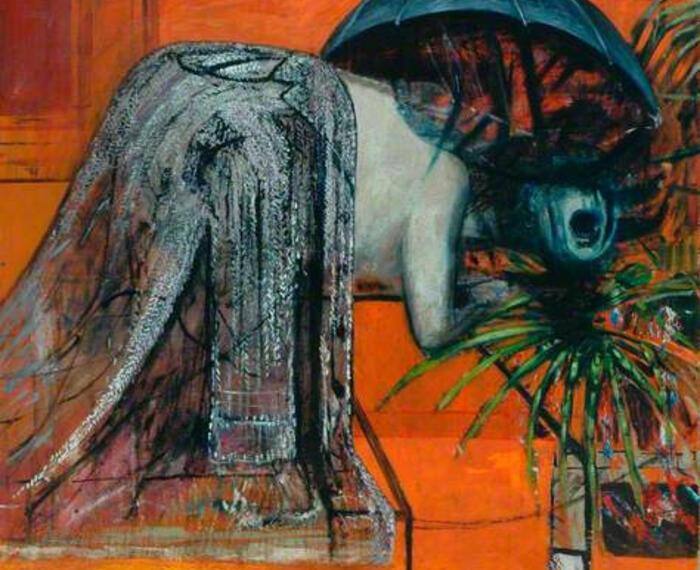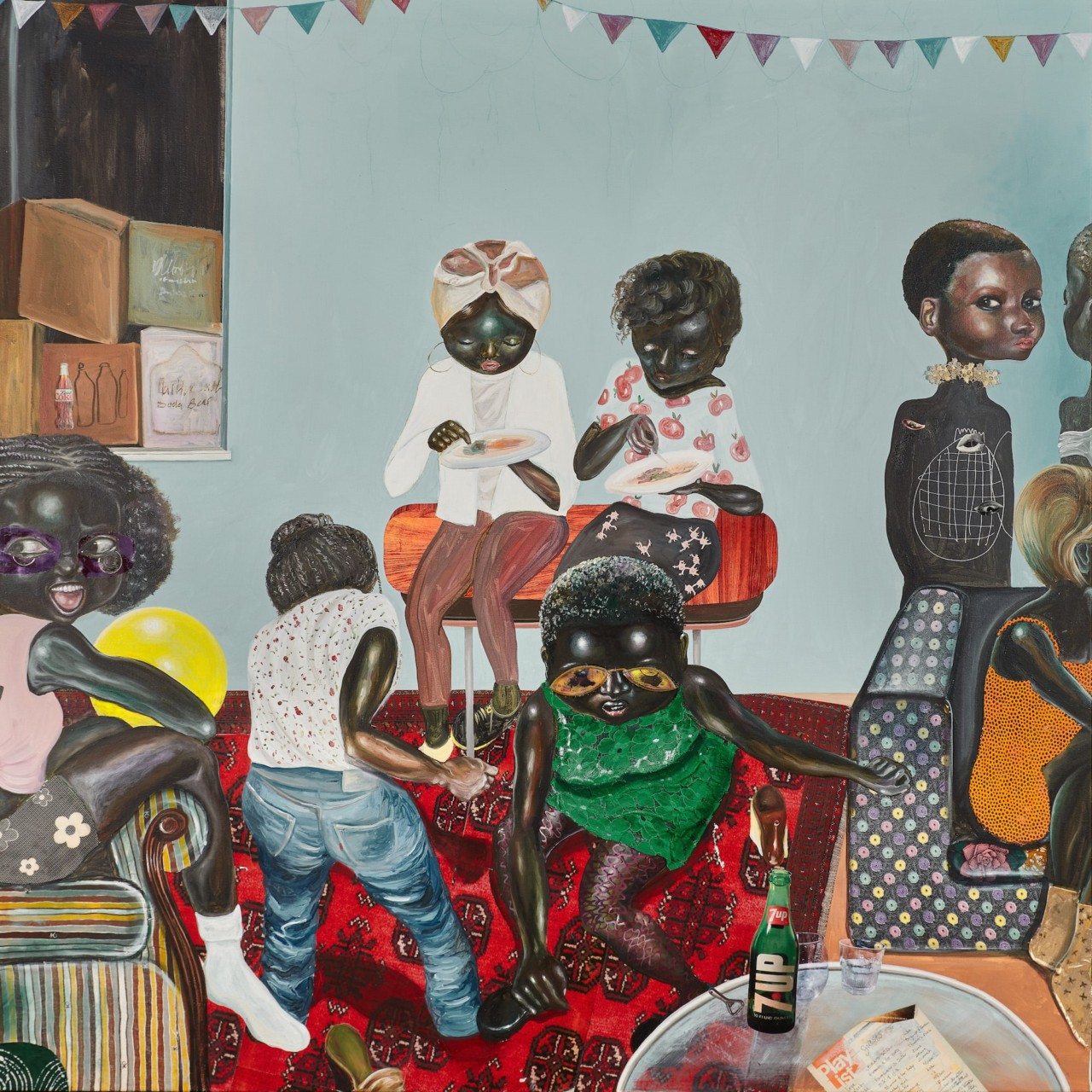


Ndidi Emefiele, Untitled (dancing to wo!!), 2018. Mixed media on canvas, 180x180cm. Courtesy of the artist and Rosenfeld Porcini
The current show at Rosenfeld Porcini is the second that Ndidi Emefiele has had at the gallery in the two years since she graduated from the MA painting course at the Slade. Picked up by the gallery on the strength of her graduation show, Emefiele’s new work reflects a ferment of activity in a short period of time.
In a 2015 interview with the online IAM magazine, the artist describes how she started out with her studio in her bedroom. The turmoil of clothes, make-up, magazines and other ephemera of a young woman’s daily life quickly became the materials for her paintings and collage. Literally the stuff of everyday life is transmogrified into large-scale, vibrant works that combine painting and collage in a style that is instantly recognisable.
Emefiele’s works invariably feature young women, their gaze turned on the viewer with unapologetic assurance. Mostly, these young women are depicted in interiors, and whether domestic or otherwise the emphasis is on the lived experience of quotidian life. Not overtly heroic, nor affecting historical or political references – yet through their assertiveness quietly claiming a territory that for a young Nigerian woman, is not uncontested.
Ndidi Emefiele was born in Abuja, Nigeria and still spends most of her time there. Having extricated herself from familial expectations of an academic career in science, she did her BA in Nigeria and then considerably later came to London to study for her MA. Traditional Nigerian society still offers typically restrictive models for black womanhood; Emefiele’s work is a direct response to this and to her desire for a life in which she can express her individuality, and creativity with greater freedom. Traditional signifiers of Nigerian culture are present in the paintings in a wholly 21st century register: plates of street food, like roasted corn with ube (African bush pear), stand next to bottles of Coke and KFC striped cups. Her female subjects do not sit demurely but sprawl, lounge, strut and slouch with simmering defiance.
There is a lot of emphasis on fashion, with western styles and Nigerian textiles combining in the outfits of a cast of cool characters. Swatches of fabrics – beaded, frilled, tasseled and sequined – dress them. The painting Somebody’s Commute, 2018, features three individuals on the London Underground – the sign for Clapham Junction station is just visible through the window. The designs of the fabrics they are wearing collide with the patterns of the TfL fabric seat covers; the deadpan, loose-limbed poise of the trio of young people gives them the look of off-duty models. The main female character, with her peroxide crop, has with her a strangely misshapen, bug-eyed toy dog of indeterminate breed that would not look out of place in a medieval donor painting.
Like many, if not all the works here, a narrative is implied. One assumes a strong autobiographical element, though the subjects could in many ways be scenes from the life of so many young city dwellers.
Untitled (dancing to wo!!), 2017-2018 is a house party scene so vivid in detail, in interactions and atmosphere, that you can almost feel the beat of the music. Colour and pattern career across the canvas, from the red of the carpet through the checked furnishing fabrics to the bunting that skims the upper edge of the frame. In the centre of the room two foreshortened dancers are getting down to the grooves while round the edge of the room women eat more roast corn and ube, or exchange gossip. A magnetic character on the left of the composition, her face radiant with amusement, looks out of the picture towards some off-stage incident. A magazine picture of a 7UP bottle is collaged in to the centre of the painting, with all the self-conscious significance of a hoover in an early Richard Hamilton. We are more than 60 years on from Pop Art, but Hamilton’s definition of it springs to mind here: “popular, transient, expendable, low-cost, mass-produced, young, witty, sexy, gimmicky, glamorous, and Big Business".
Emefiele’s stated influences are closer historically: she cites the Kenyan artist Wangechi Mutu’s glorious collage works and the prominent Nigerian textile designer Nike Okundaye. But then it also makes perfect sense that a figure like Frida Khalo, with her practice centring on self-portraiture and the creation of her persona through elaborate costume, should be a powerful model as well.
What has evolved in the last year, however, seems to be a greater complexity, a certain ambiguity in some of the painterly and narrative detail that brings an awkward and pleasing additional layer to snag the eye and the imagination. Untitled 3, 2018 is just such a work, with a rare, shadowy male figure in the background of a portrait of another confident young woman. He has no discernible features and wears white clothes that are almost a cypher by comparison to the lavish detail elsewhere. Intriguingly, one leg is semi-transparent, the terrazzo of the floor runs right through it. This detail begs to be read symbolically, as psychological background to the relationship between the two characters but is finally impossible to resolve in any conclusive way. There is a touch of magical realism here.
It is also exciting to see a group of works on paper, hung in the lower floor of the gallery. These include the collaged textiles that are so much a feature of the oil paintings, but demonstrate that the artist’s enormous facility with line and colour extends to watercolour too.
These new paintings are assured, complex and pull the viewer in to explore the myriad details and references, as well as the exuberant materiality of their making. Go listen to the voice of a new generation speaking.
Caroline Douglas
Director
Rosenfeld Porcini, 37 Rathbone St, Fitzrovia, London W1T 1NZ. Open Monday - Friday, 11.00 - 19.00, Saturday 11.00 - 18.00. Exhibition continues until 12 November 2018. www.rosenfeldporcini.com